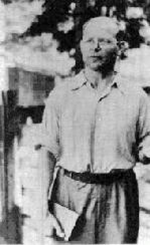| November 15, 2008 |
no comments
Our suffering enables participation in Christ’s suffering.
Third, suffering is the cause for rejoicing (1 Pet 4:13). Here is the inextricable link between suffering and joy. In spite of pain or grief, the sufferer can rejoice because of the certainty that God’s presence is with him and that the spirit of God and of glory is resting upon us (4:14).
Finally, our suffering enables participation in Christ’s suffering (1:10- 12; 4:13).

Dietrich Bonhoeffer (1906 – 1945) was a German Lutheran pastor, theologian, and participant in the German Resistance movement against Nazism.
Suffering for 1 Peter is an action, not something to be passively experienced. The word for suffering (
pathos) is closely associated with the word “passion,” intense action.
22 As Christians, we are “called to suffer,” to be passionate, not only for Christ but to actively share the sufferings of others. This means, according to Burtness, “to embrace” suffering,
23 wherever or however one finds it; we are called to embrace the sufferings of Jesus himself as we follow in his steps. For Peter, the words “martyr” and “witness” are closely linked—to be a witness to the sufferings of Christ is to participate in that suffering.
24 Bonhoeffer wrote, “When God calls a man, he bids him, ‘Come and die.’”
25 Bonhoeffer himself certainly did this. Near the camp where he was executed is a plaque which states, “Dietrick Bonhoffer, witness (martyr) for Jesus Christ among his brothers.”
26
This is undoubtedly what Professor Moltmann meant in his lecture at the Society of Pentecostal Studies (Mar. 13, 2008, at Duke University), when he stated that in the wintry anticipation of spring lies the hope of future healing and redemption. He explained that indeed it is the “groaning of creation” which reaches the ears of God, yet within that pain and groaning lies the very hope and anticipation of redemption. In fact, these are the “birth pains of the future divine dynamic.”27
These thoughts from 1 Peter go beyond the analysis of the philosophers, theologians, or sociologists. They suggest a context which can bring light, hope, and even joy to the sufferer; as Wolterstorff has commented, perhaps through our tears we see the tears of God.
Suffering is the cause for rejoicing.
McMahan stresses the importance of acknowledging our grief, “It may be that the observance of our pains, our sorrows, and our griefs may draw us nearer the cross.”
28 Through this acknowledgment, and sharing with the believing community, can come healing and a greater life in the presence of the Spirit: “Perhaps, as we share our griefs with one another as well as with out Lord…, the flames of Pentecost may truly burn as they transform us on the road to a new body, a new life and a new heaven and earth.”
29
PR
Page 5 of 6« First«...23456»
Tags: featured, peter, problem, response, suffering
Category: Biblical Studies, Fall 2008



